- Home
- Keith R. A. DeCandido
The Brave And The Bold Book One Page 12
The Brave And The Bold Book One Read online
Page 12
Still, he’d lasted three months—he was halfway to tying the Odyssey’s record for tenure by a first officer. The ship had left Utopia Planitia’s shipyards five years previous and had never had a first officer last more than half a year. One only lasted a week.
“Greetings, Commander Sisko,” Keogh said with as small a smile as it was possible for his face to engage in and still be recognizable as such. “I’m Declan Keogh. Welcome to my ship.”
“Thank you, Captain.”
Walking toward the replicator, Keogh asked, “Can I get you a drink?”
“A raktajino would be nice,” Sisko said after a moment’s consideration.
Keogh looked expectantly at Shabalala, who shook his head. He could have asked for what he wanted—a syntheholic Saurian brandy. But if he did, he would have had to endure yet another tirade about how he should try a real drink like whiskey, not “this Saurian swill.” It had only taken the first officer a week to determine that sharing drinks with the captain wasn’t worth the trouble. As it is, he thought, Sisko’s probably going to get an earful about his choice of beverage.
“A raktajino and a black coffee,” Keogh instructed the computer, which obligingly provided two mugs with same. As he handed the former to Sisko, Keogh said, “Klingon coffee, eh? Can’t abide the stuff. Never could see how a human could handle it. Like drinking an oil slick.”
Unable to resist, Shabalala added, “Only without the tangy aftertaste.”
Sisko laughed. Keogh didn’t. Shabalala shrugged, having expected precisely that reaction.
“Curzon Dax introduced me to it when I served under him as an ensign. I’m afraid it’s become something of an addiction.” Sisko took a seat on the couch against the outer bulkhead of the quarters.
Through the window over Sisko’s head, Shabalala could see the spires of Deep Space 9 from the Odyssey’s vantage point at one of the station’s upper pylons. Looking like a hollowed-out crab, the station had the aesthetic sense that Shabalala would have expected from the Cardassian Union, who built it as the seat of their occupation of Bajor decades before: hideous. Shabalala preferred the sleeker, rounded designs of Starfleet.
“You knew Dax?” Keogh said, taking a seat on the chair perpendicular to the couch. “Good lord, I haven’t heard from the old man in years. How is he doing?”
“He isn’t—exactly,” Sisko said with a smile. “Curzon died three years ago. Dax is now in Jadzia, a lieutenant in Starfleet, and my chief science officer.”
“Jadzia? You mean to say that Curzon Dax is a woman now?”
Sisko nodded.
“Some would call that ironic. Others would call it poetic justice.”
Again, Sisko smiled. “I call it lucky enough to get a damn fine science officer.”
Diplomatically put, Shabalala thought, but was wise enough not to say aloud.
Keogh tilted his head. “Perhaps. In any event, Commander, we didn’t come to your station to talk about mutual acquaintances. What’s this assignment you need my ship for?”
Sisko took a sip of raktajino, then set the mug down on the coffee table and leaned back on the sofa. “It’s several assignments, actually, Captain. Admiral Todd-man said you’d be detached to the Bajoran sector for the next two weeks.”
Shabalala smiled. “Those are the precise words he used with us. They were also the only words he used.”
“We were told you would elaborate,” Keogh added.
“Bajor is still trying to rebuild after the Occupation. Unfortunately, Cardassian mining operations have ruined some of their most arable lands. My first officer, Major Kira, has come up with a plan to convert a part of Bajor’s second moon to farmland. She and Lieutenant Dax wrote a proposal that both the provisional government and Starfleet approved.”
Keogh nodded. “And you want the Odyssey to set up the farm?”
“Eventually, yes,” Sisko said with a small smile. “There’s something you need to do first.”
“Oh?”
Shabalala had to stop himself from grinning. Keogh only said “Oh?” like that when he expected to hear something he wouldn’t like.
“Well, what’s a farm without farmers? You need to pick up a group that has volunteered to toil in the fields. They’re presently in the Valo system on the Cardassian border—specifically on the ninth planet. The Enterprise relocated them there two years ago.”
This rings a bell, Shabalala thought. “Isn’t that where many Bajorans set up resettlement camps?”
Nodding, Sisko added, “And also the base for some of their offworld terrorist activity against the Cardassians. One terrorist in particular has stayed away from Bajor even as all the other refugees were welcomed home after the withdrawal.”
Keogh’s eyes smoldered. “You’re talking about Orta, aren’t you?”
“That’s the one,” Sisko said with a grin.
Standing, Keogh said, “Commander, you can’t possibly be serious. Orta’s a terrorist of the worst kind. He was never interested in Bajor’s freedom, he just wanted revenge against the Cardassians for maiming him.”
“I see you’re familiar with Orta’s file,” Sisko said dryly.
“I’ve had my share of run-ins with the Cardassians over the years, Commander Sisko. I’ve made it my business to know as much as I can about them—and their enemies. In any case, assuming Orta’s desire to come home and be a farmer is genuine—which I very much doubt—why on Earth do you need my ship to get him back?”
“Orta refused to be escorted by a Bajoran ship. He asked for the Enterprise, but they’re unavailable, so he said another Starfleet ship would do. Since you’re in the area…” Sisko shrugged.
“Wonderful,” Keogh said, sitting back down. “I’ve been reduced to Picard’s understudy.”
Shabalala kept his best poker face on and asked, “After we’ve delivered Orta and his followers to their new home, Commander, what then?”
“Then,” Sisko said, picking up his raktajino, “it’s a matter of getting the farming colony started. There’s some material you’ll need that’s on Bajor right now, plus part of the plan calls for use of a starship’s phasers to change the composition of the land.”
Keogh actually looked intrigued by that. “Really?”
“The moon’s surface is primarily rock, but the top layers are cooled lava. Dax has come up with a way to use a ship’s phasers to convert that to soil. We’ll provide you with all the specifics,” Sisko added quickly as Keogh opened his mouth to ask another question. Again, Shabalala kept his poker face intact.
Sisko went on: “Once that’s done, we’ll have some supplies for the New Bajor colony that you’ll need to bring through the wormhole to them, and then Admiral Toddman wants you to patrol the Cardassian border for a few days. Things have been a bit tense in the DMZ lately, and Starfleet wants a top-of-the-line ship to do border patrol—remind the Cardassians that we’re taking things seriously.”
“And perhaps remind our own people of what we stand for,” Keogh said irritably.
On this, Shabalala could get behind his captain. Many Starfleet personnel had been joining the Maquis lately. A recent treaty ceded several Federation colonies near the Cardassian border to the Cardassian Union and vice versa, and also declared a Demilitarized Zone between Cardassian and Federation space. It probably seemed reasonable to the politicians who negotiated it, secure in the knowledge that it would have no direct bearing on their lives.
Meanwhile, Federation citizens who refused to give up their homes, even though those homes were no longer in Federation space, found themselves harassed by the Cardassian military. The situation deteriorated quickly, and a group of terrorists formed, naming themselves after the Maquis, resistance fighters from a twentieth-century war on Earth. Indeed, one of the Maquis founders was a former Starfleet lieutenant commander named Cal Hudson, and several Starfleet personnel had “defected” to the Maquis since then.
Keogh stared at Sisko. “Orta’s really interested in becoming a farmer?”
“Why not?” Shabalala asked, confused.
“He was tortured on Bajor,” Sisko said quietly. “It’s not always easy to put aside those associations.”
Shabalala thought about how he would react if he ever had to return to Patnira. “I see your point.”
Again, Keogh stood up. “Well, if that’s what Starfleet wants us to do, it’s what we’ll do. But I don’t see any good reason to like it. Mark my words, Commander—Orta is a killer. I’ve studied many freedom fighters in my time, including your own Major Kira, and he does not fit the bill. He’s a killer who happened to find a semi-legitimate outlet for his need for vengeance. Bringing him to Bajor in anything other than a prison transport is a mistake. I just hope we all live to regret it.”
Sisko and Shabalala also stood up, Sisko finishing his raktajino as he did so. “I hope so, too, Captain. I’ll have Lieutenant Dax forward the specifications of the farm’s setup to you so you can study it on your way to Valo.”
Again, the just-barely-a-smile. “Thank you, Commander. Mr. Shabalala will show you to the transporter room.”
“We’ll see you back here tomorrow, then.”
“Barring complications, yes.” Keogh shook the tall commander’s hand. The captain looked even more sour than usual as he looked at Sisko’s smiling face. He was definitely expecting those complications.
After they left, Sisko said to Shabalala, “You were awfully quiet in there.”
“Had nothing to say.”
Sisko shot him a look.
Smiling, Shabalala added, “Well, nothing that was worth trying to get a word in to say, anyhow. I’ve found that Captain Keogh’s monologues are best left uninterrupted. He always finishes them anyhow; it just takes longer if he has to start over.”
Sisko laughed at that, and Shabalala joined in the laugh.
As they entered the turbolift, Sisko said, “Keogh may be right about one thing—Orta’s record isn’t exactly spotless. He’s not the only former resistance member who’s stayed away from Bajor, but he is the most vocal.”
“I know, I’ve seen some of his speeches.” At Sisko’s surprised look, Shabalala shrugged. “Captain Keogh isn’t the only one who’s studied Cardassia’s enemies. Orta’s a borderline anarchist. He makes those Kohn-Ma fellows you put down last year look positively calm by comparison. I just don’t see him as the farming type.”
The turbolift stopped and its doors opened. As Shabalala led Sisko out, the latter said, “I tend to agree, but this is what the chamber of ministers wanted—and they wouldn’t approve the farming plan if Orta wasn’t part of it.”
“I thought Bajor needed this farm. Why would they jeopardize it just to please someone like Orta?”
Sisko smiled. “They’re politicians.”
Snorting, Shabalala said, “An excellent point.”
“Seriously, they need to pull all the old factions in. If Bajor’s going to get back on its feet, it needs all of Bajor—even the anarchists. They can’t afford another internal squabble like that mess earlier this year.”
“The Circle?” Shabalala remembered reading about the Alliance for Global Unity—or, simply, the Circle—that had attempted a coup d’état, leading to Starfleet temporarily abandoning Bajor and Deep Space 9. Sisko and his crew had exposed the Circle as being supplied by Cardassia—something even the Circle themselves did not know—and the coup died aborning. But that kind of unrest was not uncommon on Bajor even now, and Shabalala saw the wisdom in the provisional government attempting to unify the factions in order to avoid another such civil conflict.
“We’ll keep you apprised of our progress, Commander,” Shabalala said as they entered the transporter room.
Nodding as he stepped onto the platform, Sisko said, “Energize.”
It had all been going too smoothly—Orta knew that now. Not a single military ship had even come close, despite their going through one of the more densely populated shipping lines, and when they landed on the planetoid, they had met no resistance until they reached the rendezvous in the caves.
Cardassians loved their theatrical trials, after all, and it would be a much better show if they had footage of Orta actually purchasing the weapons from the Yridian.
Once the transaction was completed, it was as if the Cardassian soldiers grew out of the rock. It was ironic, since Orta himself had been the one to insist on meeting in the caves. Orta had always preferred dark spaces far underground. Sensors didn’t work as well underground, and the darkness was better for Orta’s guerilla tactics than Central Command’s more overt ones.
But this time they used that predilection against him. They got the Yridian to make the deal, and made the weapons—stolen Starfleet phaser rifles—impossible for Orta to resist. It was the perfect setup, and Orta fell for it.
They brought him to Bajor, of course. It was the first time he’d set foot on his homeworld since he stowed away in the cargo hold of a Ferengi trader at the age of ten. His foster parents—Orta had been orphaned as an infant—had just died. They were collaborators who had made the mistake of betraying the Cardassians to help a group of Bajoran refugees. They tried to play both ends, and wound up disintegrated for their trouble.
Orta had no great love for his foster parents, but he had less for the Cardassians who rewarded their compassion with death. He swore he would show them death.
He showed them plenty. For twenty years, “Orta”went from being the name of a forgotten runaway orphan to that of the scourge of the Cardassians. He made dozens of strikes against Bajor’s oppressors, gaining a deserved reputation for brutality. It got to the point where every off-Bajor terrorist act was credited to Orta whether he was involved or not.
And now they had captured him. He had brought only one compatriot to the rendezvous, and she had died in the firefight. Central Command knew he had dozens of followers. The trial would be much more effective if it ended with a score of executions instead of one. But Orta would not yield, not to the glinn who ruined his face on the transport, nor to the Obsidian Order agent who carved out his vocal cords on Bajor.
When even the vaunted Obsidian Order proved unable to pry the information out of Orta, they—in a rare show of cooperation with Central Command—agreed to transfer Orta to a gul named Madred. Orta knew of many who had been sent to Madred. None returned unbroken.
That was when he struck back.
The Cardassians’mistake was in thinking that burning off half his face and allowing him to speak only through the benefit of an electronic vocoder attached to his neck had softened him up, with Madred prepared to deliver the killing blow.
It only increased his determination.
Orta never found out the name of the Obsidian Order agent who ruined his larynx. But as Orta carved the man to pieces with the very kitchen knife the agent had used to cut his food while eating in front of a starving Orta for days on end, the Bajoran pretended that it was his foster mother he was killing, that it was his foster father who screamed in agony, that it was the Cardassian who’d killed them who begged for his life.
His people rescued him at great risk to themselves. A team of fifteen had mounted the rescue mission, and only four of them—counting Orta himself—made it back to the Valo system.
Within an hour of his return, he had already planned an assault on Central Command’s listening post at Chin’toka.
Each Cardassian he killed was that Obsidian Order agent, that glinn, Madred, his foster parents—it didn’t matter. None of it mattered, as long as Cardassians continued to die. It would never end.
Orta woke up suddenly. He did not scream—he could not even if he felt the urge to. His vocoder lay on the ground next to his pallet. Without it, he could n
ot utter any sounds. With it, he spoke clearly and eloquently, albeit with a slight artificial timbre. With the damage done to his face, his mouth could not properly form words in any case. In many ways, the Obsidian Order agent had done him a favor. Had he left his vocal cords intact, Orta’s speaking voice would have been slurred, distorted, foolish. Forced to rely on technology, he could still rally his people to his cause with the same eloquence he’d had before his temporary capture.
At least for a while. After a time, the terrorists’ equipment started breaking down. Weapons ceased to function, warp drives went inert, and Orta’s reputation had grown to such epic proportions that everyone was scared to even do business with him. The Cardassians made it clear that anyone caught dealing with Orta would receive the strictest punishment possible. His activities became curtailed, limited to strikes on the border at the Valo system. It got to the point that the Cardassians’ attempt to frame Orta for the attack on the Federation colony at Solarion IV failed because the terrorist’s own resources had dwindled to the point that such an attack was no longer physically possible for him to achieve.
Two years ago came the final insult: the cause no longer existed. The Cardassians had withdrawn from Bajor. His homeworld was free. Orta had thought it too good to be true—a trick to lull the refugees, the terrorists, the freedom fighters out of hiding and then have them all killed.
Instead, he soon realized, the Cardassians had played the ultimate joke on Bajor: they now had to govern them-selves. They proved as inept as Orta had feared. A “provisional” government formed. At the first opportunity, they begged the cowards of the Federation for help; they fell victim to internecine politics and attempted coups. The only leader on the planet worth a damn was Kai Opaka, and she died within months of the withdrawal.

 Alien
Alien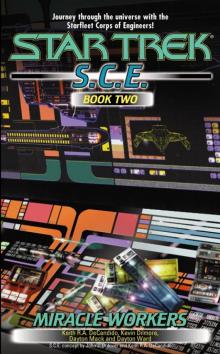 Miracle Workers
Miracle Workers Articles of the Federation
Articles of the Federation Supernatural Heart of the Dragon
Supernatural Heart of the Dragon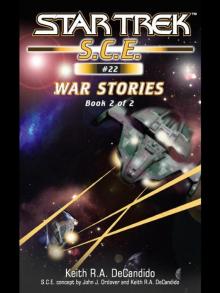 War Stories: Book Two
War Stories: Book Two The Zoo Job
The Zoo Job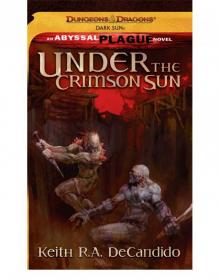 Under the Crimson Sun
Under the Crimson Sun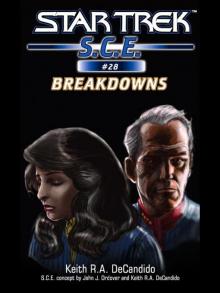 Breakdowns
Breakdowns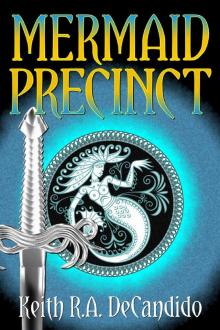 Mermaid Precinct (ARC)
Mermaid Precinct (ARC) Supernatural 1 - Nevermore
Supernatural 1 - Nevermore STAR TREK - The Brave and the Bold Book One
STAR TREK - The Brave and the Bold Book One Four Walls
Four Walls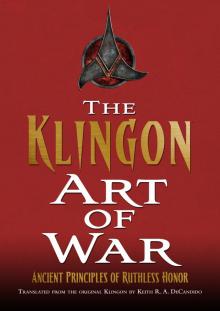 The Klingon Art of War
The Klingon Art of War Blackout
Blackout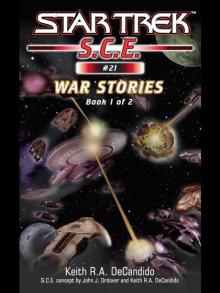 War Stories: Book One
War Stories: Book One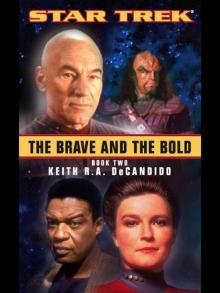 The Brave and the Bold Book Two
The Brave and the Bold Book Two Honor Bound
Honor Bound Sleepy Hollow: Children of the Revolution
Sleepy Hollow: Children of the Revolution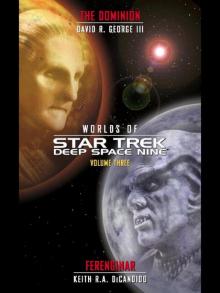 Worlds of Star Trek Deep Space Nine® Volume Three
Worlds of Star Trek Deep Space Nine® Volume Three Star Trek: TNG: Enterprises of Great Pitch and Moment
Star Trek: TNG: Enterprises of Great Pitch and Moment Genesis
Genesis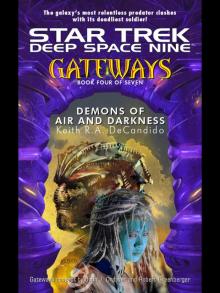 Demons of Air and Darkness
Demons of Air and Darkness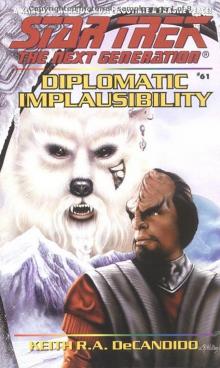 Star Trek - TNG - 61 - Diplomatic Implausibility
Star Trek - TNG - 61 - Diplomatic Implausibility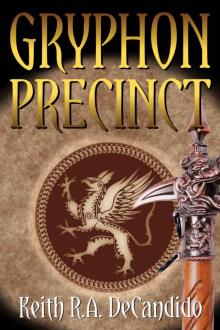 Gryphon Precinct (Dragon Precinct)
Gryphon Precinct (Dragon Precinct)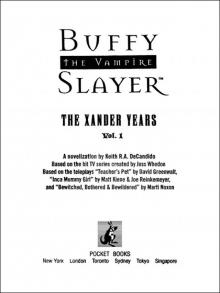 THE XANDER YEARS, Vol. 1
THE XANDER YEARS, Vol. 1 Nevermore
Nevermore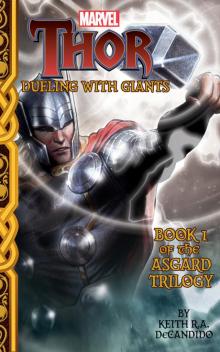 Thor
Thor The Brave And The Bold Book One
The Brave And The Bold Book One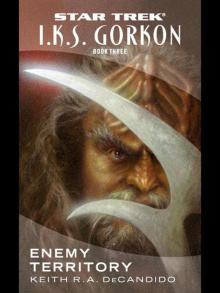 I.K.S. Gorkon Book Three
I.K.S. Gorkon Book Three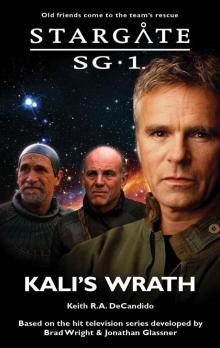 STARGATE SG-1: Kali's Wrath (SG1-28)
STARGATE SG-1: Kali's Wrath (SG1-28)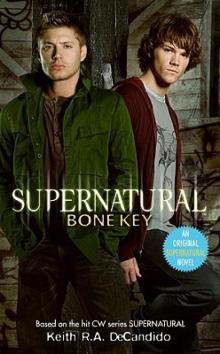 Bone Key
Bone Key Guilt in Innocece
Guilt in Innocece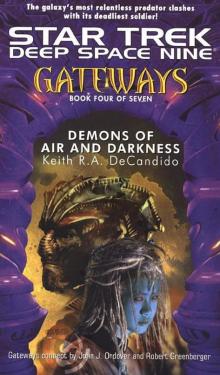 Star Trek - DS9 Relaunch 04 - Gateways - 4 of 7 - Demons Of Air And Darkness
Star Trek - DS9 Relaunch 04 - Gateways - 4 of 7 - Demons Of Air And Darkness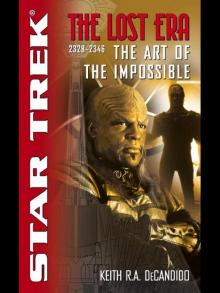 The Art of the Impossible
The Art of the Impossible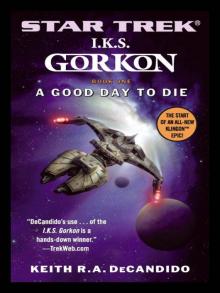 I.K.S. Gorkon Book One: A Good Day to Die
I.K.S. Gorkon Book One: A Good Day to Die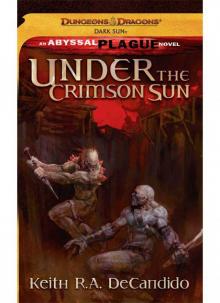 Under the Crimson Sun (the abyssal plague)
Under the Crimson Sun (the abyssal plague)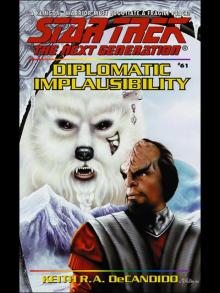 DIPLOMATIC IMPLAUSIBILITY
DIPLOMATIC IMPLAUSIBILITY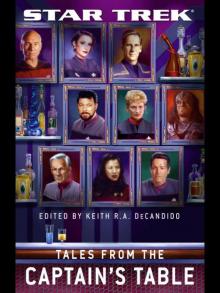 Tales from the Captain's Table
Tales from the Captain's Table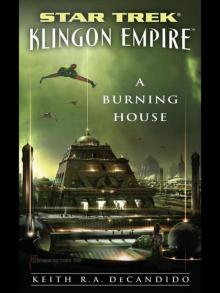 A Burning House
A Burning House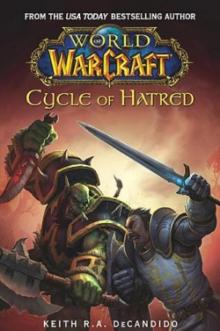 Cycle of Hatred (world of warcraft)
Cycle of Hatred (world of warcraft)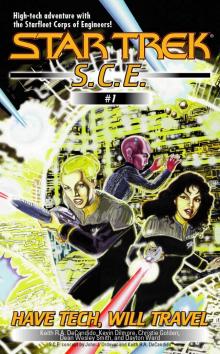 Have Tech, Will Travel
Have Tech, Will Travel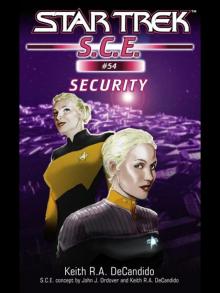 Security
Security